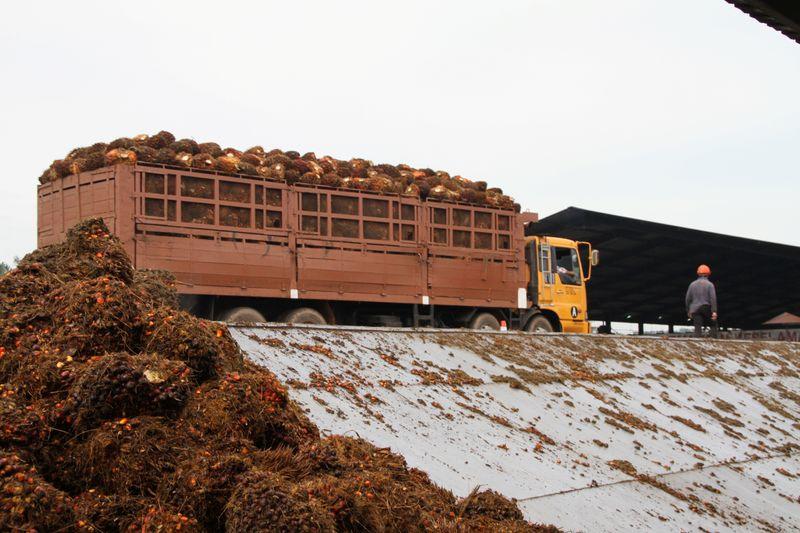India asks refiners to stop buying Malaysian palm oil after political row - sources
By Rajendra Jadhav and Aftab Ahmed,
Reuters•January 7, 2020
By Rajendra Jadhav and Aftab Ahmed
MUMBAI/NEW DELHI (Reuters) - India has informally asked palm oil refiners and traders to avoid buying Malaysian palm oil, government and industry sources said on Tuesday, following Malaysian criticism of India's actions in the Kashmir region and its new citizenship law.
India is the world's biggest buyer of the oil and palm oil inventories could spike in Malaysia, putting prices under pressure if Indian refiners reduce purchases from the country. Malaysian prices are the global benchmark for palm oil prices.
A senior official in India's vegetable oil industry, who did not wish to be named, said the government had asked refiners at a meeting attended by two dozen vegetable oil industry officials in New Delhi on Monday to boycott Malaysia.
"In Monday's meeting we have been verbally told to avoid buying Malaysian palm oil," the official said.
"We've had various rounds of meetings within the government and industry to see how we could reduce imports from Malaysia," one Indian government official said, adding India has yet to firm up a plan of action and is exploring various options.
Malaysian Prime Minister Mahathir Mohamad has angered India over his comments on India's actions in Kashmir and over a new Indian citizenship law, which critics say chips away at India's secular foundations and could be used by to discriminate against Muslims.
In October, Indian traders stopped signing new contracts with Malaysia for a brief period fearing India will raise import tax on Malaysian palm oil after Mahathir told the U.N. General Assembly that India had "invaded and occupied" Kashmir, a disputed Muslim-majority region also claimed by Pakistan.
Last month, Mahathir, prime minister of a predominantly Muslim nation, also waded into the debate about India's new citizenship law, which has led to violent protests in India and at least 25 deaths in clashes with police.
"People are dying because of this law. So why is there a necessity to do this thing when all this while, for 70 years almost, they have lived together as citizens without any problem?" Mahathir said last month.
The Indian government has made it clear it wants to punish Malaysia for these remarks and traders should support it, said another industry official.
"The government has been struggling to find ways to restrict imports from Malaysia due to World Trade Organization rules. For the time being it asked for industry co-operation," he said.
India's trade ministry did not immediately respond to a request for comment.
Malaysia's Primary Industries Minister Teresa Kok, responsible for the palm oil industry, told Reuters on the sidelines of an industry event that the government has not received any official statement or notice from India about cutting imports from Malaysia.
"There are some discussions going on but until they officially announce, we don't know whether it's true," said Kalyana Sundram, CEO of Malaysian Palm Oil Council, a state agency responsible for promoting palm oil.
Palm oil accounts for nearly two-thirds of India's total edible oil imports. India buys more than 9 million tonnes of palm oil annually, mainly from Indonesia and Malaysia.
Indian refiners and traders have already contracted Malaysian palm oil for shipments in January and small amounts for February, said a Mumbai-based dealer with a global trading firm.
"The impact of Monday's meet would be clearly visible from March onward - Indonesia's exports will rise," the dealer said.
Indonesia is the world's biggest producer of palm oil, followed by Malaysia. Palm oil is crucial for the Malaysian economy as it accounts for 2.8% of Malaysia's gross domestic product and 4.5% of total exports.
(Reporting by Rajendra Jadhav and Aftab Ahmed; Additional reporting by Mei Mei Chu in Kuala Lumpur; Editing by Euan Rocha and Susan Fenton)

Palm fresh fruit bunches are delivered to a mill in JohorMore
KUALA LUMPUR (Reuters) - Malaysian palm oil futures recovered from early losses on Tuesday on bargain buying, but gains were capped by worries of a disruption to export shipments in case of an escalation in Middle East tensions.
The benchmark palm oil contract for March delivery on the Bursa Malaysia Derivatives Exchange edged up 26 ringgit, or 0.9%, to 3,068 ringgit ($749.39) during the midday break.
Palm oil had traded down for two straight sessions, easing from its near-three year high gained last week when it hit 3,149 ringgit on Friday - the highest since January 2017.
"Lower Dalian and higher ringgit kept the market depressed at opening, but a rebound in the equity markets from bargain buying helped reverse losses," said Sathia Varqa, owner and co-founder of Singapore-based Palm Oil Analytics.
Tensions between the United States and Iran have weighed on equity markets and some commodity markets in Malaysia. The market remain nervous as a war in the Middle East could disrupt shipment routes and drive up freight charges, traders said.
Losses were limited by forecasts of lower stockpiles and production in December. Malaysia's palm oil stockpiles likely fell 8.5% from November to 2.06 million tonnes, the lowest in 27 months, a Reuters survey showed on Sunday.
Yield of the tropical oil is also expected to be lower in the first half of 2020 due to poor rainfall and lower fertilizer usage in top producers Malaysia and Indonesia in early 2019.
A stronger ringgit, palm's currency of trade, makes the edible oil more expensive for holders of foreign currency. The ringgit was up 0.2% against the dollar.
Dalian's most-active soyoil contract was unchanged, while its palm oil contract both dipped 0.9% lower as Chinese funds closes their books ahead of the Chinese New Year holidays. Elsewhere, soyoil prices on the Chicago Board of Trade gained 0.2%.
Palm oil is affected by price movements in related oils as they compete for a share in the global vegetable oils market.
(Reporting by Mei Mei Chu; Editing by Arun Koyy
No comments:
Post a Comment